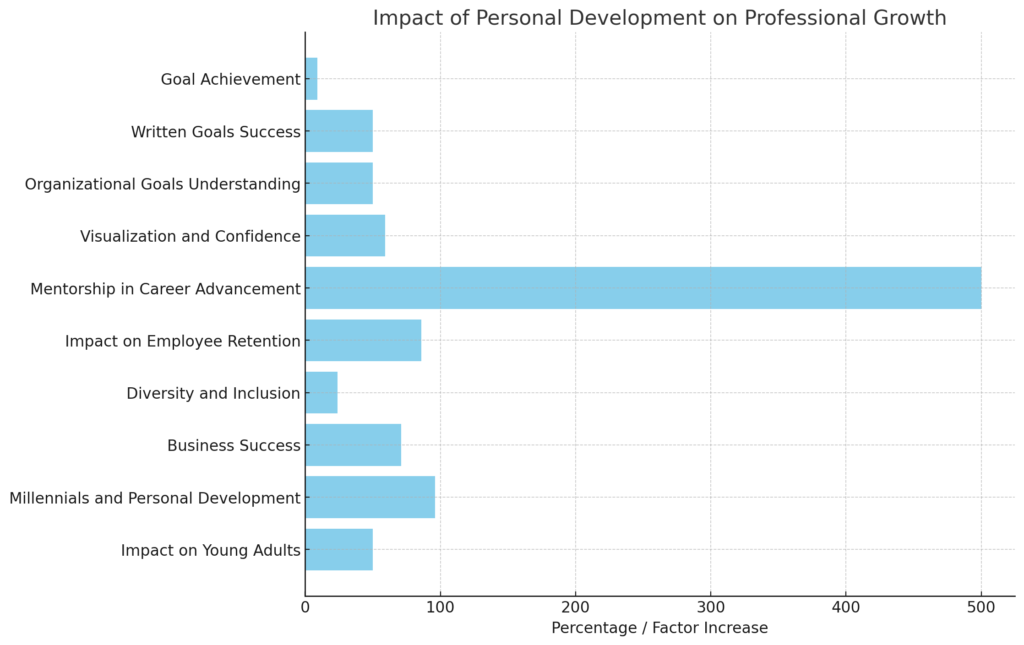In the dynamic world of business, the importance of setting personal goals cannot be overstated. Personal goals are the driving force behind professional growth, acting as the catalysts that propel individuals towards success in their careers. Understanding the intricate relationship between personal development and business achievements is essential for anyone looking to make their mark in the corporate world. This article explores the symbiosis between personal aspirations and professional advancement, emphasizing the importance of setting and pursuing personal goals within a business context.
The journey towards achieving business success is often a reflection of one’s personal growth. Setting personal goals is not just about achieving individual milestones; it’s about aligning these objectives with your professional life. This alignment is crucial as it ensures that personal development directly contributes to business achievements, creating a harmonious balance between one’s aspirations and their career.
Setting Achievable Personal Goals
Charting the Course: Identifying Personal Objectives
The first step in achieving personal goals in business is to clearly define what these goals are. Identifying personal goals involves introspection and a realistic assessment of what you hope to achieve. These goals can range from improving specific skills and gaining expertise in certain areas to achieving work-life balance or excelling in leadership roles. The key is to ensure that these goals are SMART: Specific, Measurable, Achievable, Relevant, and Time-bound.
Aligning Personal Aspirations with Business Targets
Once personal goals are set, the next crucial step is to align them with your business objectives. This alignment is significant as it ensures that your personal growth directly impacts and contributes to the success of the business. Whether it’s enhancing skills that are valuable in your role, adopting a mindset that fosters innovation, or developing leadership qualities that drive team success, aligning personal goals with business objectives creates a cohesive path to professional development and achievement.
Strategies for Reaching Your Goals
Crafting Your Personal Goal Roadmap
Achieving personal goals in business requires a well-thought-out plan. Start by breaking down your larger goals into smaller, manageable tasks. This approach makes the process less overwhelming and provides a clear roadmap for progression. Each small task completed brings you a step closer to your ultimate goal.
Mastering Time Management
Effective time management is crucial. Begin by analyzing how you currently spend your time and identify areas where you can be more efficient. Utilizing tools like digital calendars, to-do lists, and time-tracking apps can greatly enhance productivity. Allocate specific times for focused work and ensure you stick to these schedules.
Prioritizing Tasks Effectively
Not all tasks are created equal. Prioritize tasks based on their importance and urgency. Focus on activities that directly contribute to achieving your goals and delegate or postpone those that are less critical. This prioritization ensures that your energy is spent on tasks that yield the most significant results.
Balancing Work and Life
Maintaining a healthy work-life balance is essential for long-term success. It’s important to set boundaries between work and personal time. Regular breaks, hobbies, and spending time with loved ones can rejuvenate your energy and enhance overall productivity.
Essential Habits for Goal Achievement
1. Effective Communication
Clear and effective communication is key in any business setting. It ensures that your ideas are understood and your needs are met. Good communication skills also help in building strong relationships with colleagues, mentors, and networks, which can be invaluable in achieving your goals.
2. Embracing Continuous Learning
The business world is ever-evolving, and staying updated with the latest trends and skills is crucial. Continuous learning can take many forms, from formal education to self-study. Embrace every opportunity to learn, whether it’s attending workshops, reading industry publications, or learning from peers.
3. Developing Resilience
The path to achieving personal goals is often fraught with challenges. Resilience – the ability to bounce back from setbacks – is a vital trait. This involves maintaining a positive outlook, learning from failures, and viewing challenges as opportunities to grow.
4. Cultivating a Growth Mindset
Adopt a growth mindset – the belief that abilities and intelligence can be developed. This mindset fosters a love for learning and a resilience that is essential for great accomplishment.
5. Networking and Relationship Building
Building a strong professional network is invaluable. Attend industry events, engage in online forums, and reach out to potential mentors. These relationships can provide support, advice, and opportunities that aid in achieving your goals.
The Role of Personal Development in Business Success
Insights from the Frontlines of Business
Industry leaders universally acknowledge the significant impact of personal development on professional success. They advocate that personal growth, encompassing everything from skill enhancement to emotional intelligence, is not just beneficial but essential in the modern business environment. Leaders share that individuals who are committed to self-improvement tend to be more innovative, adaptable, and effective in their roles.
Personal Growth as a Catalyst for Professional Advancement
The journey of personal development often mirrors and enhances one’s professional journey. Skills acquired through personal growth initiatives, such as leadership training, communication workshops, or even time management courses, directly translate to increased efficacy in the workplace. Furthermore, a commitment to personal growth demonstrates a proactive and dedicated mindset, qualities highly valued in any professional setting.
Professional Growth and Personal Development: Key Statistics

This graph presents a compelling visual representation of the significant impact that personal development has on various aspects of professional growth and business success. It encapsulates data from a range of credible sources, illustrating key areas where personal development plays a crucial role:
1. Goal Achievement: Highlights the modest 9% success rate of achieving New Year’s resolutions, underscoring the challenge in goal accomplishment.
2. Written Goals Success: Shows that individuals who write down their goals have a 50% greater chance of success, emphasizing the power of documentation.
3. Organizational Goals Understanding: Reveals that only 50% of top-level managers can clearly articulate their organization’s top goals, pointing to a potential gap in corporate clarity.
4. Visualization and Confidence: Indicates that 59% of people who visualize their goals feel more confident, suggesting the psychological benefits of goal visualization.
5. Mentorship in Career Advancement: Demonstrates a substantial impact of mentorship, where individuals with mentors are five times more likely to advance in their careers.
6. Impact on Employee Retention: Highlights that 86% of professionals consider personal development opportunities crucial for their decision to stay with a company.
7. Diversity and Inclusion: Shows that personal development programs can lead to a 24% increase in diversity representation within organizations.
8. Business Success: Indicates that 71% of Fortune 500 companies offer personal development programs, reflecting the value placed on these programs in successful businesses.
9. Millennials and Personal Development: Reports a high 96% millennial retention rate in firms with effective personal development programs.
10. Impact on Young Adults: Notes the positive influence of personal development on young adults, with a significant 50% impact on various aspects of their lives.
Overcoming Challenges and Staying Motivated
Navigating the Roadblocks to Personal Goals
Achieving personal goals is rarely a smooth journey; obstacles and setbacks are common. Common challenges include time constraints, resource limitations, and external pressures. To overcome these, effective strategies include breaking goals into smaller, manageable tasks, seeking support and resources where needed, and being flexible in approach.
Keeping the Flame of Motivation Alive
Maintaining motivation in the face of challenges is crucial. One effective method is to keep your ultimate goal in sight and remind yourself of why it’s important to you. Celebrating small victories along the way can also boost morale. Additionally, adopting a positive mindset and learning from setbacks rather than being discouraged by them can keep the motivational fires burning. Seeking inspiration from mentors, peers, or even motivational literature and talks can provide a much-needed boost when motivation wanes.
FAQs
How do I set realistic personal goals that align with my business objectives?
Start by analyzing your business objectives and identify areas where your personal growth can contribute to these goals. Set realistic and achievable targets by considering your current skills, resources, and time constraints. Use the SMART criteria to ensure your goals are well-defined and attainable.
What strategies can I use to balance my personal and professional life while pursuing these goals?
Balancing personal and professional life requires effective time management and prioritization. Allocate specific time blocks for work, personal development, and leisure. Learn to delegate tasks when necessary and avoid the pitfall of overcommitting. Remember, maintaining a healthy work-life balance is key to long-term success and well-being.
How often should I reassess my personal goals?
Regular reassessment of your personal goals is crucial. Set a routine, perhaps every quarter, to review your progress. Be prepared to adjust your goals as needed based on changing circumstances, new opportunities, and the insights you gain as you progress.
In conclusion
The journey of setting and achieving personal goals in business is a dynamic and ongoing process. It underscores the profound connection between personal development and professional success. Setting personal goals not only propels individuals towards their career aspirations but also drives business growth and innovation. As we navigate the ever-changing business landscape, the importance of continuous personal development, coupled with regular reassessment of our goals, remains paramount. Embracing this approach ensures that our personal and professional lives are not just successful, but also fulfilling and aligned with our core values and aspirations.

Thomas J. Powell is the Senior Advisor at Brehon Strategies, a seasoned entrepreneur and a private equity expert. With a career in banking and finance that began in 1988 in Silicon Valley, he boasts over three and a half decades of robust experience in the industry. Powell holds dual citizenship in the European Union and the United States, allowing him to navigate international business environments with ease. A Doctor of Law and Policy student at Northeastern University, he focuses on middle-income workforce housing shortages in rural resort communities. He blends his professional acumen with a strong commitment to community service, having been associated with the Boys and Girls Clubs of America for over 45 years. Follow Thomas J Powell on LinkedIn, Twitter,Crunchbase.

